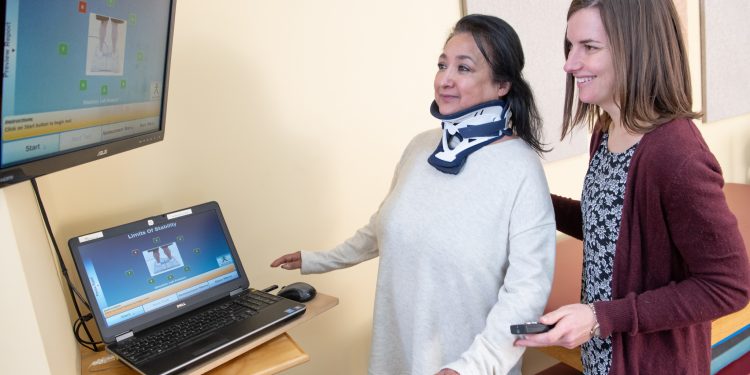by Mariah Morgan PT, DPT, CBIS
Dizziness, the sensation of spinning around or losing one’s balance, is a common symptom following a brain injury (concussion, stroke, brain bleed, etc.). While symptoms of dizziness are common among brain injury survivors, many are not aware of why they are experiencing them or where to seek help.
Following a brain injury, two systems in the body are often affected, vestibular and visual. If one, or both, of these systems are impaired, symptoms of dizziness will likely occur.
Vestibular System
The vestibular system is located inside our inner ear and aids us in maintaining our balance and regulating our posture with our surrounding environment. It tells us information about spatial orientation, our head position, and motion. The vestibular system allows us to recognize when we are standing or lying down, when an elevator goes up or down, when a car accelerates, etc.
If your vestibular system is not functioning correctly, you may:
- Feel like you are on a boat;
- Feel unsteady;
- Have difficulty walking in the dark or on uneven surfaces (i.e., grass); and/or
- Have dizziness or vertigo when turning your head or changing position (i.e., laying down or sitting up).
Visual System
The visual system gives us the ability to you guessed it see! It allows us to track a moving target (watch a ball move across a field) and enables us to jump from one target to the next (changing lines when reading). The visual system is also one of the three sensory systems that help us keep our balance.
If your visual system is not functioning correctly, you may experience:
- Eyestrain;
- Headaches; and/or
- Dizziness with eye movements (when the head is not moving).
Symptoms of a visual system that is not correctly functioning may include difficulty reading, working on a computer, tolerating a busy environment (like a grocery store), and more.
Vestibular, Visual, or Both?
While some may experience only vestibular or visual dysfunction in isolation, it is common for both to occur following a brain injury. If vestibular or visual symptoms are occurring, an evaluation from a brain injury provider may help to identify the causes. Following an exam done by a professional, an individualized treatment plan can be created to improve the functioning of both systems and to, ultimately, decrease dizziness.
For anyone struggling with dizziness following a brain injury, there is hope! Dizziness can be treated. If you have a brain injury and are struggling with dizziness, connect with your doctor. Your doctor can then connect you with a brain injury professional who can create a customized treatment plan for you.
Mariah Morgan is a Physical Therapist and Certified Brain Injury Specialist at Origami Brain Injury Rehabilitation Center. Origami Brain Injury Rehabilitation Center is a CARF accredited 501(c)(3) nonprofit organization. Origami provides comprehensive rehabilitation for adolescents and adults with neurological dysfunction through their residential, outpatient, and community based programs. With their compassionate and innovative services, Origami creates opportunities and transforms lives. Learn more at OrigamiRehab.org











